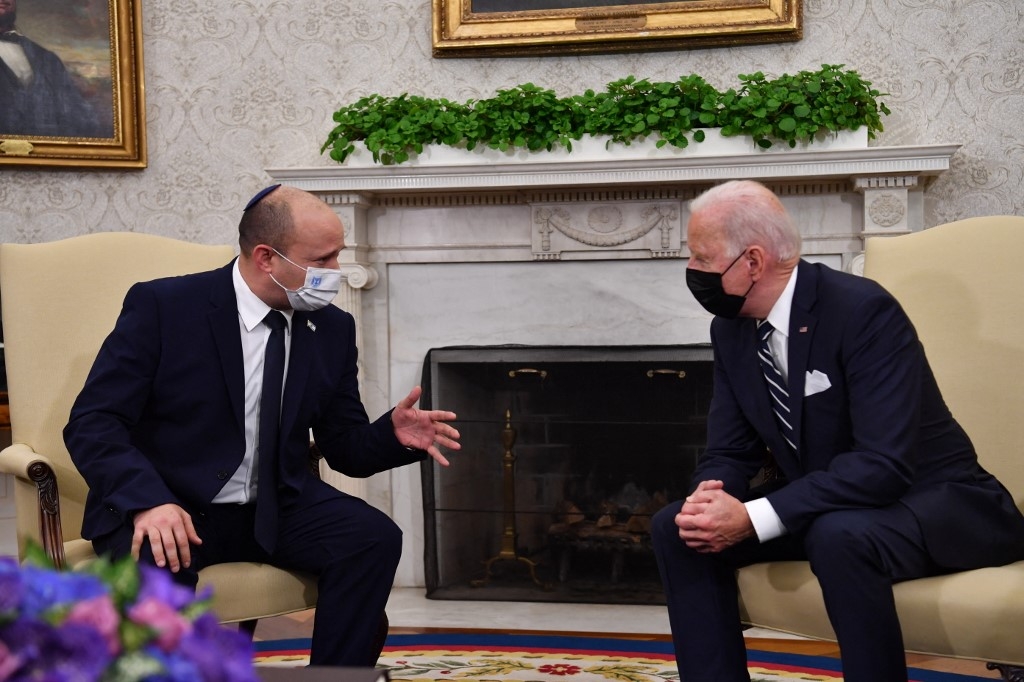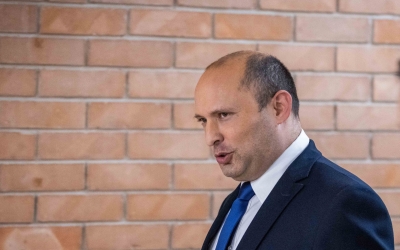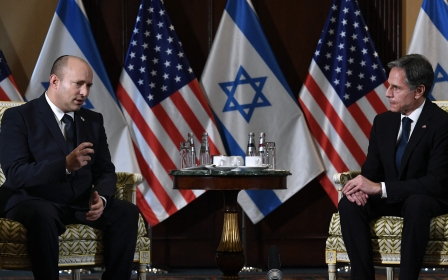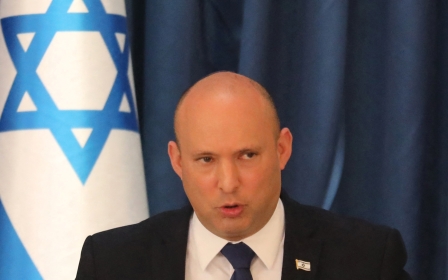Biden-Bennett summit a meeting of wishful thinkers who oppose Netanyahu

US President Joe Biden and Israeli Prime Minister Naftali Bennett's meeting on Friday was full of niceties with the aim of projecting an image of true friendship. But practically speaking, it was the convergence of two narratives of wishful thinking.
It was the first meeting between the two newly-elected leaders, who have a 30-year age gap and share very little in common in terms of values, world view, or policies.
If there is anything that binds together Biden, who entered the White House seven months ago, with Bennett who has led a very narrow and fragile coalition since June, it is their mutual nemesis, former Israeli Prime Minister Benjamin Netanyahu.
Biden and Bennett will do everything in their power to make sure that Netanyahu, currently vacationing with his wife and son on a Hawaiian island owned almost wholly by Jewish-American billionaire Larry Ellison, will remain an opposition leader.
Clashing interests
New MEE newsletter: Jerusalem Dispatch
Sign up to get the latest insights and analysis on Israel-Palestine, alongside Turkey Unpacked and other MEE newsletters
During the meeting, Biden had hoped to persuade and move Bennett to reignite, if even symbolically, the Israeli-Palestinian peace process which has been thrown into a dark alley.
The Israeli premier, on the other hand, didn’t mention the Palestinians, preferring to attempt to convince the American president that Iran is rushing to become a nuclear threshold state.
But hovering over the visit - and largely overshadowing it - was the spectre of Afghanistan and the threat of terror attacks against US forces.
At the moment, Biden’s attention span for any other issue is very short. The White House decision to postpone the meeting with Bennett by 24 hours was a good illustration of current US priorities. Afghanistan and the orderly withdrawal of US forces by the end of the month are top of the list.
Before departing for his quick 48-hour visit, Bennett made some comments reminiscent of his predecessor, Benjamin Netanyahu, in an interview with the New York Times.
Bennet stressed that he opposes restarting negotiations with the Palestinian Authority (PA), rejects a Palestinian state, and wants to construct more housing in Jewish settlements in the West Bank. But he also said that annexing the occupied West Bank, advocated by Netanyahu but blocked by US President Donald Trump, is not on the cards.
Biden's administration, however, stands against all these statements and policies, which Bennett articulates largely to please a small, right-wing audience. Biden wants to completely freeze any expansion of Jewish settlements, renew peace talks and, with the help of the CIA, improve Palestinian-Israeli security cooperation in the battle against Hamas and Islamic Jihad.
Also high up on the US agenda is the plan to restore financial aid to the PA and reopen the US consulate in occupied East Jerusalem, both shuttered during the Trump era.
To please Israel, Biden said he would waive the need for Israelis to have visas in order to enter the US and would resupply Israel with Iron Dome missiles left in short supply after the fighting with Hamas in May.
Israel's wish list
Iran and its nuclear aspirations are also a source of differing opinions between the two leaders. Nevertheless, the two have agreed that their differences will be handled with soft voices behind the scenes, not with public roars as Netanyahu used to do.
On Iran, Israel has a three-pronged wish list for the US:
- To roll back or at least reduce Iran's push for regional hegemony and its involvement through its Shia proxies and militias in the domestic affairs of countries across the Middle East
- To stop Iran from supplying weapons to Shia and Sunni groups in the Middle East, including Hezbollah, Hamas and Islamic Jihad, the Houthis and Kata’ib Hezbollah, an Iran-backed paramilitary group in Iraq
- To agree to bomb Iran’s nuclear sites as a last resort if economic and diplomatic pressure to curtail its activities are exhausted.
But Bennett knows that Biden has very limited goals. His administration opposes Iran’s supply of weapons and its activities that destabilise the region, but he has no intention to act unilaterally and militarily.
The era of the US playing the world’s policeman has been slowly fading since George W Bush’s presidency and further with Barack Obama and Trump. Now, under Biden, the US role in the region has largely evaporated.
During the 50-minute meeting with Bennett, Biden reiterated that he would not allow Iran to have nuclear weapons. "We're putting diplomacy first and see where that takes us. But if diplomacy fails, we're ready to turn to other options," he said, without providing any specific details.
One thing is certain. Biden will not do what his three predecessors refrained from doing: bombing Iran’s nuclear sites.
Consolation prize
Bennett and his military and intelligence advisers know very well that the Biden administration is very anxious for Iran to return to the 2015 nuclear deal with the six major powers, the agreement which Trump ripped up.
They also know that Israel has very limited military options and scenarios to attack Iran’s nuclear installations. Certainly, it will not happen as long as the US is against it.
'More covert operations by the Mossad and CIA are expected as long as Iran plays hardball
under its new hardline president'
Rhetorically, Israel opposes the return of the nuclear deal, but it is ready to accept this reality. Yet it also hopes that at least the deal will be amended to tighten international supervision and attach to it punishable clauses if Iran is found in breach of its commitments.
Between 2015 and 2018 when Trump left the deal, Iran committed several violations, but Obama’s US and the other major powers turned a blind eye.
If there is a grain of consolation for Israel it lies in the fact that in the first face-to-face meeting of Biden-Bennett, the intelligence and military on both sides agreed to increase their strategic cooperation with a focus to expose Iran’s behaviour in the region and its nuclear ambitions.
Thus, more covert operations by the Mossad and CIA are expected as long as Iran plays hardball under new hardline president Ebrahim Raisi. Above all the meeting in Washington has proven that despite all the disagreements, the US is still a strong and important ally of Israel.
This article is available in French on Middle East Eye French edition.
Middle East Eye delivers independent and unrivalled coverage and analysis of the Middle East, North Africa and beyond. To learn more about republishing this content and the associated fees, please fill out this form. More about MEE can be found here.






